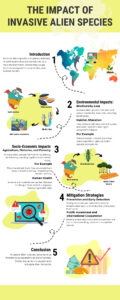Talk about how invading alien species affect the ecosystem and the socioeconomic system. (Answer in 200 words)
The Paris Peace Conference held after the end of WWI, established the League of Nations. The primary objectives of the League were to promote international peace and security by settling international disputes through principle of collective security and to seek international cooperation for socio-eRead more
The Paris Peace Conference held after the end of WWI, established the League of Nations. The primary objectives of the League were to promote international peace and security by settling international disputes through principle of collective security and to seek international cooperation for socio-economic development across the world.
Role of the League of Nations in maintaining International peace
- Resolution of international disputes: The League sought to peacefully resolve territorial disputes between the members. For instance, it persuaded Greece to pay compensation to Bulgaria, when the former invaded the latter.
- It also solved a territorial dispute between Peru and Columbia.
- In 1921, when there was a dispute regarding Upper Silesia between Germany and Poland, the League successfully made both the parties reach a settlement and Upper Silesia was partitioned between the two.
- Opium trade and plight of refugees: The League also worked to combat the international trade in opium and sexual slavery and helped alleviate the plight of refugees, particularly in Turkey in the period to 1926. One of its innovations in this area was its 1922 introduction of the Nansen passport, which was the first internationally recognised identity card for stateless refugees.
- Monitoring the Governance of Mandates: The Permanent Mandates Commission supervised League of Nations mandates, and also organised plebiscites in disputed territories like SAAR region of Germany, so that residents could decide which country they would join.
- Promotion of human welfare: The League’s Health organization played a key role in finding causes of different epidemics. It was especially successful in combating the Typhus epidemic in Russia which had the potential to spread to the rest of Europe.
However, the League had certain limitations like:
- It had limited success in preserving international peace as it failed to intervene in many conflicts leading up to World War II, including the Italian invasion of Abyssinia, the Spanish Civil War, and the Second Sino-Japanese War.
- Further, the League was powerless and mostly silent in the face of major events leading to World War II such as Hitler’s remilitarisation of the Rhineland, occupation of the Sudetenland and Anschluss with Austria, which had been forbidden by the Treaty of Versailles.
- General weaknesses within the organization, such as voting structure that made ratifying resolutions difficult and incomplete representation among world nations.
- Additionally, the power of the League was limited by the United States’ refusal to join.
Thus, though the organization managed to de-escalate some tensions between nations and contributed to the concept of international law, the League was unable to prevent member nations from starting World War II.
See less
Environmental Impacts: Invasive alien species compete with native species for resources, reducing biodiversity. They change habitats, nutrient cycles, and water systems, which can lead to ecosystem collapse. Example: Zebra mussels in North American waterways block pipes, push out native mussels, andRead more
- Environmental Impacts:
- Invasive alien species compete with native species for resources, reducing biodiversity.
- They change habitats, nutrient cycles, and water systems, which can lead to ecosystem collapse.
- Example: Zebra mussels in North American waterways block pipes, push out native mussels, and alter aquatic ecosystems.
- Socio-Economic Impacts:
- Invasive alien species harm farming, fishing, and forestry, causing significant economic losses.
- Example: The emerald ash borer has destroyed ash trees in North America, leading to losses in the timber industry and higher costs for removing and replacing trees.
- Invasive alien species can spread diseases and allergens, affecting human health.
- Example: The Asian tiger mosquito carries diseases like dengue fever and chikungunya, increasing health risks and public health costs.
- Mitigation Strategies:
- Strong prevention, early detection, and quick response strategies are needed.
- Raising public awareness and working together internationally are crucial for controlling the spread of invasive alien species.

See less